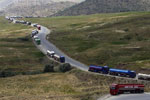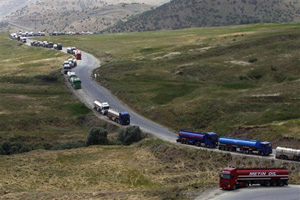 New York Times: The price of fuel has risen sharply in parts of Afghanistan as an Iranian-imposed slowdown on tanker traffic at key border crossings has stretched into its second month, Afghan officials say.
New York Times: The price of fuel has risen sharply in parts of Afghanistan as an Iranian-imposed slowdown on tanker traffic at key border crossings has stretched into its second month, Afghan officials say.
The New York Times
By RAY RIVERA and RUHULLAH KHAPALWAK
 KABUL, Afghanistan — The price of fuel has risen sharply in parts of Afghanistan as an Iranian-imposed slowdown on tanker traffic at key border crossings has stretched into its second month, Afghan officials say.
KABUL, Afghanistan — The price of fuel has risen sharply in parts of Afghanistan as an Iranian-imposed slowdown on tanker traffic at key border crossings has stretched into its second month, Afghan officials say.
The slowdown has increased the price of refined fuel by more than 50 percent in some provinces, forced gas stations on major highways to close and driven up the costs of other basic commodities, including food and heating oil, just as winter is setting in. The bottleneck is also hurting farmers in the south who depend on diesel pumps for irrigation.
The issue threatens to strain relations between Afghanistan and Iran, and adds yet another obstacle to President Hamid Karzai and NATO forces as they try to rebuild the economy and provide government services in the face of a resurgent Taliban.
It also presents new logistical and security challenges for the government and private fuel brokers as they look to ease the shortage by increasing tanker traffic through northern borders with Turkmenistan and Uzbekistan. That would require moving the fuel down long, dangerous highways to Afghanistan’s southern provinces, where the fuel crisis and the insurgency have been the most intense.
Hundreds of fuel tankers are stranded at the country’s main border crossings with Iran, stopped by Iranian border agents, and the number making it across has slowed to a trickle. About 40 tankers a day are crossing the border at Herat, Farah and Nimruz Provinces, compared with 250 to 330 a day before, according to commerce and customs officials.
About 40 percent of Afghanistan’s fuel comes through Iran, on its western border, although most of it does not originate there.
Afghan officials say that the Iranian authorities have told them they have been blocking the trucks out of concern that the fuel is being used by NATO military forces in Afghanistan, an assertion that NATO and the Afghan government deny.
“The national security team of the Iranian government has decided that coalition and NATO forces are using this fuel for their own use,” Faridullah Sherzai, head of the Afghan Commerce Ministry’s fuel department, said Saturday. “The Iranians want to place some restrictions to ensure these fuels are not used for military forces, but these fuels are not used by NATO forces at all, they are used by civilians in everyday life.”
Feda Hussein Maliki, Iran’s ambassador in Kabul, acknowledged that Iran was concerned that fuel was supporting NATO forces, but insisted that it was not blocking the border.
“Some media have said that Iran has stopped importing fuel to people of Afghanistan,” he told reporters last week. “This is not true. We do give fuel to people of Afghanistan, and this is included in our plans.”
Officials in Tehran referred questions about the issue on Sunday to their Foreign Ministry, which said it was not available for comment.
The slowdown began in early December as the Iranian authorities blocked as many as 2,500 fuel tankers from crossing the border, Mr. Sherzai said. Most of the fuel they are carrying is not Iranian, he added, but comes from Turkmenistan and Iraq.
After a meeting in Tehran late last month between President Mahmoud Ahmadinejad of Iran and several high-level Afghan officials, including the first vice president, the flow eased somewhat, Mr. Sherzai said. But it remains only a fraction of what it was.
At Pul-i-Abrishamin in Nimruz Province, one of the main border crossings with Iran, hundreds of trucks were waiting to cross on Sunday, but officials said they expected only about 15 to make it through by day’s end. The slowdown there has cost the Afghan government tens of thousands of dollars in lost customs fees, said Elhamuddin Mazhar, the chief of the local customs office.
The cost of refined fuel, meanwhile, has increased by 53 percent in Nimruz, to $1,500 a ton from $980 a ton, said Hajji Ubidullah Noorzai, head of the Nimruz Chamber of Commerce.
He estimated that 80 percent of gas stations in the province had temporarily shut down. “Especially on the highways connecting Nimruz with the rest of the provinces,” he said. “There are only a handful of petrol stations that are selling fuel.”
Though the cultivation season is largely over in much of the south, agriculture is taking a hit in the areas where wheat production is still under way.
“Yesterday I had four or five farmers come to my office and ask for help,” said Mohammed Akbar Sharifi, head of the Nimruz Province Agriculture Department. “They said they are no longer able to work on their tractors and pump water due to the high fuel prices.”
At Islam Qala, the main border crossing in Herat Province, 21 fuel tankers crossed the border on Wednesday and 42 on Thursday, said Khaliqullah, the head of customs there, who goes by one name, as many Afghans do. By midafternoon Saturday, only five had crossed, he said.
“On a regular day 100 to 150 cross our border,” he said.
Customs officials in Nimruz and Herat say their Iranian counterparts have assured them the issue will be cleared up as early as Tuesday or Wednesday, but Mr. Sherzai said he did not expect a quick resolution. He said the government had begun efforts to increase imports through other borders.
Some local agricultural officials worried that if fuel costs remained high, they could drive farmers to cultivate poppies, a more cost-effective crop as opium prices have soared. At the least, higher fuel costs could make it more difficult for NATO and government officials to persuade poppy producers to shift to alternative crops.
“If the fuel ban continues by Iran’s government for months, and the fuel price keeps going up and up, there is a possibility the farmers would resort back to poppy,” said Ahmad Shah Roshan, head of the Agriculture Department in Kandahar Province.
“Nobody would be able to stop them,” Mr. Sharifi of Nimruz Province, said separately, “since poppy needs less water and makes good money.”
Muhammad Aslam, a farmer and landlord in the Maywand District of Kandahar Province, said in a phone interview that fuel prices were a “big deal” for local farmers that could have long-term consequences.
“Most of the bore wells are not operating due to the prices of fuel, and farmers are unable to buy fuel,” he said. “There are some people who do have some budget to buy fuel with this current price, but most of the farmers are unable to buy. We want the government to help us in this regard and not to let our trees and farms go dry. The government should have a proper contract to import fuel from other countries.”
The price increase has also been felt at the kitchen table.
“Buying one jar or bottle of cooking oil used to be 900 Afghanis, but now it has gone up to 1,250 Afghanis,” Mr. Aslam said. “These are the things that we use in our daily life, and living has become more difficult with these high prices. From one side we are worried how we are going to water our farms and from other side we have to feed ourselves.”
Sangar Rahimi and Sharifullah Sahak contributed reporting from Kabul, and William Yong from Tehran.


